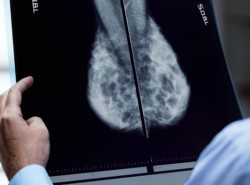
Precision Genomic Medicine in Breast Cancer
Published: 05/21/20 3:57 AM

Bruce Mann
Project Description: A range of genetic mutations have now been identified as increasing the risk of breast cancer, or influencing treatment response. However, most women with breast cancer are currently not offered genetic testing. Professor Bruce Mann (The Royal Women’s Hospital and the University of Melbourne) will implement a translational project to assess the effectiveness of routine genetic testing for all women with breast cancer. This will include an assessment of the psychosocial impacts of testing.
Why this work is needed: Despite an emerging understanding of the importance of the genetic profile in breast cancer, most women are not offered testing at the time of diagnosis. This means patients, and their doctors, do not have access to medical information that could influence their management and treatment decisions.
Expected outcomes: This study will investigate the effectiveness of routine genetic testing for newly-diagnosed women with breast cancer. Importantly, it will also evaluate the psychosocial implications, such as the effect genetic test results have on family members (who may also be at risk of a hereditary mutation), and the need for counselling for women who undergo genetic testing.
Project details
Breast cancer development and response to treatment can be profoundly influenced by both germline genetic mutations (those inherited from parents) and somatic mutations (those that occur as breast cancer develops). Despite this, most women are not offered genetic testing when they are diagnosed with breast cancer. For example, over half of women who have a germline mutation in the BRCA genes do not have a family history, and so would not typically be offered a genetic test.
It is now possible to identify both germline and somatic mutations at the time of diagnosis, using a method called whole genome sequencing. This would provide additional information to patients and their doctors, to help guide discussions about prognosis and treatment options.
In this study, 150 women who are newly diagnosed with invasive breast cancer at the Victorian Comprehensive Cancer Centre (VCCC) in Melbourne will be offered whole genome sequencing. Genetic counselling will be provided.
If genetic testing is to be rolled out as a routine test for all women with breast cancer, we need to have a better understanding of how the test will affect women and their families. As such, a large part of this study will be to explore the acceptability of testing, and to ensure that clinicians, patients and their relatives are sufficiently informed, prepared and supported during and after the testing process.